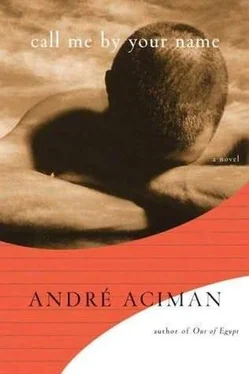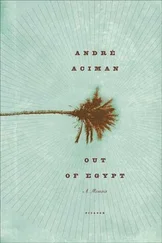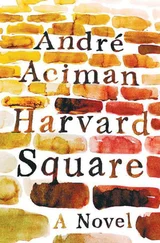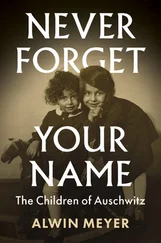André Aciman - Call Me by Your Name
Здесь есть возможность читать онлайн «André Aciman - Call Me by Your Name» весь текст электронной книги совершенно бесплатно (целиком полную версию без сокращений). В некоторых случаях можно слушать аудио, скачать через торрент в формате fb2 и присутствует краткое содержание. Год выпуска: 2007, Издательство: Farrar, Straus and Giroux, Жанр: Современная проза, на английском языке. Описание произведения, (предисловие) а так же отзывы посетителей доступны на портале библиотеки ЛибКат.
- Название:Call Me by Your Name
- Автор:
- Издательство:Farrar, Straus and Giroux
- Жанр:
- Год:2007
- ISBN:нет данных
- Рейтинг книги:5 / 5. Голосов: 6
-
Избранное:Добавить в избранное
- Отзывы:
-
Ваша оценка:
- 100
- 1
- 2
- 3
- 4
- 5
Call Me by Your Name: краткое содержание, описание и аннотация
Предлагаем к чтению аннотацию, описание, краткое содержание или предисловие (зависит от того, что написал сам автор книги «Call Me by Your Name»). Если вы не нашли необходимую информацию о книге — напишите в комментариях, мы постараемся отыскать её.
is clear-eyed, bare-knuckled, and ultimately unforgettable.
Call Me by Your Name — читать онлайн бесплатно полную книгу (весь текст) целиком
Ниже представлен текст книги, разбитый по страницам. Система сохранения места последней прочитанной страницы, позволяет с удобством читать онлайн бесплатно книгу «Call Me by Your Name», без необходимости каждый раз заново искать на чём Вы остановились. Поставьте закладку, и сможете в любой момент перейти на страницу, на которой закончили чтение.
Интервал:
Закладка:
Someone was coming toward the rocks. I tried to think of something to dispel my sorrow and fell upon the ironic fact that the distance separating Vimini from me was exactly the same that separated me from Oliver. Seven years. In seven years, I began thinking, and suddenly felt something almost burst in my throat. I dove into the water.
It was after dinner when the phone rang. Oliver had arrived safely. Yes, in New York. Yes, same apartment, same people, same noise — unfortunately the same music streaming from outside the window — you could hear it now. He put the receiver out the window and allowed us to get a flavor of the Hispanic rhythms of New York. One Hundred and Fourteenth Street, he said. Going out to a late lunch with friends. My mother and father were both talking to him from separate phones in the living room. I was on the phone in the kitchen. Here? Well, you know. The usual dinner guests. Just left. Yes, very, very hot here too. My father hoped this had been productive. This? Staying with us, explained my father. Best thing in my life. If I could, I’d hop on the same plane and come with the shirt on my back, an extra bathing suit, a toothbrush. Everyone laughed. With open arms, caro . Jokes were being bandied back and forth. You know our tradition, explained my mother, you must always come back, even for a few days. Even for a few days meant for no more than a few days — but she’d meant what she said, and he knew it. “Allora ciao, Oliver, e a presto,” she said. My father more or less repeated the same words, then added, “Dunque, ti passo Elio — vi lascio.” I heard the clicks of both extension phones signal that no one else was on the line. How tactful of my father. But the all-too-sudden freedom to be alone across what seemed a time barrier froze me. Did he have a good trip? Yes. Did he hate the meal? Yes. Did he think of me? I had run out of questions and should have thought better than to keep pounding him with more. “What do you think?” was his vague answer — as if fearing someone might accidentally pick up the receiver? Vimini sends her love. Very upset. I’ll go out and buy her something tomorrow and send it by express mail. I’ll never forget Rome so long as I live. Me neither. Do you like your room? Sort of. Window facing noisy courtyard, never any sun, hardly any room for anything, didn’t know I owned so many books, bed way too small now. Wish we could start all over in that room, I said. Both leaning out the window in the evening, rubbing shoulders, as we did in Rome — every day of my life, I said. Every day of mine too. Shirt, toothbrush, scorebook, and I’m flying over, so don’t tempt me either. I took something from your room, he said. What? You’ll never guess. What? Find out for yourself. And then I said it, not because it was what I wanted to say to him but because the silence was weighing on us, and this was the easiest thing to smuggle in during a pause — and at least I would have said it: I don’t want to lose you. We would write. I’d call from the post office — more private that way. There was talk of Christmas, of Thanksgiving even. Yes, Christmas. But his world, which until then seemed no more distant from mine than by the thickness of the skin Chiara had once picked from his shoulders, had suddenly drifted light-years away. By Christmas it might not matter. Let me hear the noise from your window one last time. I heard crackle. Let me hear the sound you made when…A faint, timid sound — on account of because there were others in the house, he said. It made us laugh. Besides, they’re waiting for me to go out with them. I wished he had never called. I had wanted to hear him say my name again. I had meant to ask him, now that we were far apart, whatever had happened between him and Chiara. I had also forgotten to ask where he’d put his red bathing suit. Probably he had forgotten and taken it away with him.
The first thing I did after our telephone conversation was go up to my room and see what he could possibly have taken that would remind him of me. Then I saw the unyellowed blank spot on the wall. Bless him. He had taken a framed, antique postcard of Monet’s berm dating back to 1905 or so. One of our previous American summer residents had fished it out in a flee market in Paris two years ago and had mailed it to me as a souvenir. The faded colored postcard had originally been mailed in 1914—there were a few hasty, sepia-toned scribbles in German script on the back, addressed to a doctor in England, next to which the American student had inscribed his own greetings to me in black ink— Think of me someday . The picture would remind Oliver of the morning when I first spoke out. Or of the day when we rode by the berm pretending not to notice it. Or of that day we’d decided to picnic there and had vowed not to touch each other, the better to enjoy lying in bed together the same afternoon. I wanted him to have the picture before his eyes for all time, his whole life, in front of his desk, of his bed, everywhere. Nail it everywhere you go, I thought.
The mystery was resolved, as such things always are with me, in my sleep that night. It had never struck me until then. And yet it had been staring me in the face for two whole years. His name was Maynard. Early one afternoon, while he must have known everyone was resting, he had knocked at my window to see if I had black ink — he had run out, he said, and only used black ink, as he knew I did. He stepped in. I was wearing only a bathing suit and went to my desk and handed him the bottle. He stared at me, stood there for an awkward moment, and then took the bottle. That same evening he left the flask right outside my balcony door. Any other person would have knocked again and handed it back to me. I was fifteen then. But I wouldn’t have said no. In the course of one of our conversations I had told him about my favorite spot in the hills.
I had never thought of him until Oliver had lifted his picture.
A while after supper, I saw my father sitting at his usual place at the breakfast table. His chair was turned out and facing the sea, and on his lap were the proofs of his latest book. He was drinking his usual chamomile tea, enjoying the night. Next to him, three large citronella candles. The mosquitoes were out with a vengeance tonight. I went downstairs to join him. This was our usual time to sit together, and I had neglected him over the past month.
“Tell me about Rome,” he said as soon as he saw me ready to sit next to him. This was also the moment when he would allow himself his last smoke of the day. He put away his manuscript with something of a tired toss that suggested an eager now-we-come-to-the-good-part and proceeded to light his cigarette with a roguish gesture, using one of the citronella candles. “So?”
There was nothing to tell. I repeated what I’d told my mother: the hotel, the Capitol, Villa Borghese, San Clemente, restaurants.
“Eat well too?”
I nodded.
“And drank well too?”
Nodded again.
“Done things your grandfather would have approved of?” I laughed. No, not this time. I told him about the incident near the Pasquino. “What an idea, to vomit in front of the talking statue!
“Movies? Concerts?”
It began to creep over me that he might be leading somewhere, perhaps without quite knowing it himself. I became aware of this because, as he kept asking questions remotely approaching the subject, I began to sense that I was already applying evasive maneuvers well before what was awaiting us around the corner was even visible. I spoke about the perennially dirty, run-down conditions of Rome’s piazzas. The heat, the weather, traffic, too many nuns. Such-and-such a church closed down. Debris everywhere. Seedy renovations. And I complained about the people, and the tourists, and about the minibuses loading and unloading numberless hordes bearing cameras and baseball hats.
Читать дальшеИнтервал:
Закладка:
Похожие книги на «Call Me by Your Name»
Представляем Вашему вниманию похожие книги на «Call Me by Your Name» списком для выбора. Мы отобрали схожую по названию и смыслу литературу в надежде предоставить читателям больше вариантов отыскать новые, интересные, ещё непрочитанные произведения.
Обсуждение, отзывы о книге «Call Me by Your Name» и просто собственные мнения читателей. Оставьте ваши комментарии, напишите, что Вы думаете о произведении, его смысле или главных героях. Укажите что конкретно понравилось, а что нет, и почему Вы так считаете.









